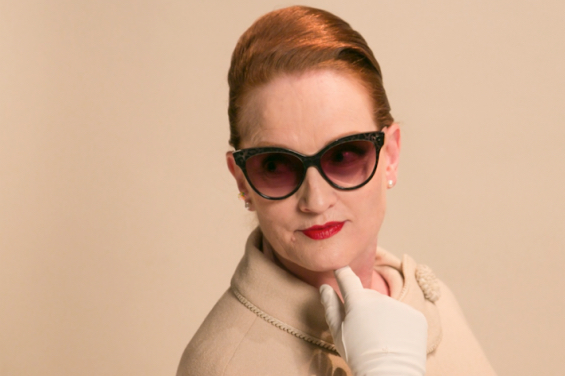When Edith returns from Europe to Canberra after working with the failed League of Nations, she is determined to be Australia’s first female diplomat and continue to “serve the world”. In her new world of Australian post-war-politics and society, its rigidity well suggested through the shifting and sliding Mondrian-like grids that compose the backdrop (Maria T Reginato), Edith tries to fulfill what she feels is her potential to make a difference. The visionary daughter of highly individuated parents, she sees herself as a defender of the Universal Declaration of Human Rights and destined to contribute to its implementation on a global scale. Her clarity and energy are reinforced by the primary colours (Mondrian again) of her costumes designed by Imogen Keen.
Despite Edith’s willingness to dedicate her life to higher goals and her justified confidence in her resourcefulness, her aspirations are cruelly frustrated. Canberran conventions of the ’50s typified by the Public Service Marriage ban reflected the general post-war Australian inscription of women’s identity as within the domestic space. We feel Edith’s pain when she asks, “Do you know what it’s like to know what you’re capable of but never find a way to offer it?” Her brother’s partner Janice (Kiki Skountzos) expresses this same despair protesting that she is more capable than “half of the bloody men” chosen as organisers.
Eventually Edith is offered a minor post organising a Canberra town planning conference, bringing her into touch with the visionary plans of Walter Burley Griffin, but even this is threatened through the renewal of her relationship with her brother Fred (Craig Alexander), an organiser for the Communist Party. Her office and her elegant cumquat tree – her personal touch of class – are desecrated. Nevertheless, Edith maintains the relationship. When Fred and Janice are endangered by the introduction of a bill outlawing Communism, Edith allows them to store Party records in her house because she feels an essential freedom is under threat. In keeping with her conscience, she breaks with her old mentor, Justice Latham (Gerard Caroll), for supporting the ban and not upholding the Universal Declaration of Human Rights.
Most significantly, Canberran insularity also threatens her lavender marriage. While she and British diplomat husband, Ambrose (a delightful Tobias Cole), have a civilised and affable understanding, Ambrose’s predilection for cross-dressing has to be kept secret. After he gives a very entertaining private preview of his performance en femme of “Why Can’t You Behave”, his obvious reluctance to leave his feminine persona intimates that the forthcoming public concert will be disastrous. Regretfully, their tender, witty and original relationship, finely conveyed by Valentine, is sacrificed to Edith’s lustful craving for safe respectability.
Another marriage this time to a public servant without a surname and an off-the-shelf family of two boys gains her an office “inside the Prime Minister’s corridor”. While she has deserved “notice” through the publication of an article, “Atoms for Peace and the Future of Specialised Diplomacy”, nevertheless she apparently needs the influence of Richard (Gerard Caroll) to be “in the conversation”. Humiliated, she learns that her link with the British High Commission was the clinching fact for Menzies. When at last the lofty Gough Whitlam (Nick Byrne) recognises her vital contribution in revealing British dishonesty about atomic testing and invites her to become an “eminent person”, our resolute Edith travels to Israel on the much desired diplomatic passport.
While Edith ultimately achieves her goal, she has not only betrayed her genuine love for Ambrose but also Fred and Janice as she passed on information about members of the Communist Party to ASIO. As she says, “one can consummately bungle one’s loyalties’. Balanced against her personal failures is her envisioning of a ‘republic of the mind’, a concept akin to Mondrian’s vision of modern art as transcending divisions in culture by creating a new language and in tune the Burley Griffin’s concept of a democracy of the spirit.
An intriguing, thoughtfully staged production, in which songs that comment on the action and the richness of Adam Lindsay Gordon’s poetry judiciously leaven historical fact, cultural allusions and intellectual provocation. Congratulations to the director Caroline Stacey for surmounting the challenge presented by the complexity of Valentine’s text, which is both a celebration of our symbolic capital and of Frank Moorhouse’s quite remarkable creation, Edith Campbell Berry.





